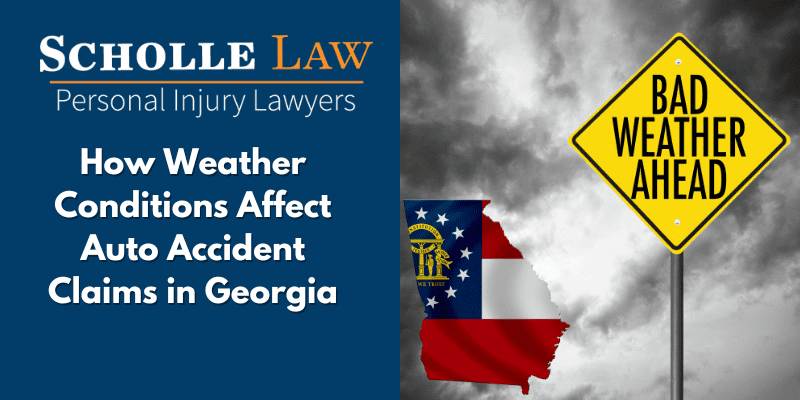4.9 Rating
Google REVIEWS
Leaders in Georgia Personal Injury Law Since 1995
How Weather Conditions Affect Auto Accident Claims in Georgia
In Georgia, weather is not just a background element; it directly influences the risk of car accidents and the subsequent claims process. Torrential rain, dense fog, and icy conditions can all transform roads into hazardous paths, increasing accident odds and complicating liability. This article delves into “how weather conditions affect auto accident claims in Georgia”, guiding you through the potential impact on driving safety and the intricacies of legal responsibility and insurance claims in the face of weather-related challenges.

Key Takeaways
- Nearly 22% of vehicle crashes in Georgia are due to adverse weather conditions, with rain, fog, and high winds significantly impairing driving safety by reducing visibility, creating slippery roads, and compromising vehicle stability.
- Georgia law requires drivers to exercise reasonable care regardless of the weather, and fault determination in weather-related accidents considers factors such as whether a driver adapted their behavior to conditions; drivers may share fault under the state’s modified comparative negligence rule.
- Success in weather-impact accident claims relies heavily on evidence like photographs, witness statements, and weather reports; and expertise of a car accident lawyer is vital to navigate the legal process, manage claim disputes, and support pursuit of fair compensation.

Navigating Georgia’s Weather: Understanding Its Impact on Car Accidents
Georgia’s unpredictable weather patterns represent a serious threat on the road, not just a topic of casual conversation. Adverse weather conditions, including the dreaded blanket of fog or the relentless pour of rain, create hazardous driving conditions that significantly increase the likelihood of car accidents. In fact, statistics reveal that nearly 22% of vehicle crashes in the Peach State can be traced back to the wrath of Mother Nature. From Atlanta’s congested highways to the winding rural roads, no driver is immune to the perils brought on by bad weather, making an Atlanta car accident a real possibility during such conditions.
Weather conditions pose more than just an inconvenience; they create a barrage of risks for drivers. Reduced visibility, slippery roads, and gusting winds each play their part in transforming a routine drive into a potential disaster. We will explore in depth how these conditions compromise your safety and increase the potential for accidents, to comprehend the full extent of weather’s impact on the road.
The Influence of Reduced Visibility on Driving Safety
When the world outside your car windows becomes a hazy blur, the risk of an accident escalates. Reduced visibility is more than just an annoyance—it’s a hazard. Fog, heavy rain, or snow can reduce visibility drastically, increasing the chances of rear-end collisions, side swipes, and accidents at intersections. Imagine cruising along only to find that the tail lights ahead have vanished into a grey mist, or approaching an intersection just as traffic signals become obscured by a veil of rain. It’s not just about seeing but also being seen; many drivers fail to realize that their own vehicle may be invisible to others in these conditions.
Under such conditions, it may be safest to find a sheltered place to wait until the weather improves, particularly when intense precipitation obscures visibility almost entirely. But if you must continue, slow down, increase your stopping distance, and keep your eyes peeled for road signs and other vehicles. Driving safely in reduced visibility means heightened awareness and a firm grasp on your driving behavior.
Slippery Roads and Loss of Vehicle Control
Rain-soaked streets are not just an inconvenience—they’re a slippery trap for the unwary driver. Wet road surfaces extend braking distances, sometimes doubling the space you need to come to a complete stop. Picture this: you’re driving at a comfortable speed, the rain is a steady drumbeat against your windshield, and suddenly, the car in front of you brakes. You slam on your pedals, expecting to halt in time, but the slick asphalt beneath you betrays your vehicle’s grip, and you skid forward with a heart-stopping jolt.
Maintaining control while steering on slippery surfaces becomes a delicate balancing act. The finesse of a driver’s touch on the wheel can mean the difference between staying the course and spinning out of control. And let’s not forget about hydroplaning, where a layer of water between your tires and the road can make your car feel like it’s surfing rather than driving. Add to that the risk of encountering icy roads or floods—where even a mere 12 inches of rushing water can carry away most vehicles—and it’s clear that driving safely on slippery roads necessitates a cautious and attentive approach.
How High Winds Compromise Vehicle Stability
One should never underestimate the force of the wind, especially while driving. High winds can turn a simple drive into a battle to keep your vehicle steady, with high-profile vehicles like trucks and SUVs particularly vulnerable due to their larger surface area. These vehicles, soaring high above the ground, can feel the full force of a strong gust, tilting perilously as if they might topple over with the next blast. Side winds, too, are treacherous adversaries, capable of pushing your car off its intended path, suddenly compromising stability and increasing the risk of accidents.
Being aware of predicted weather conditions is essential for drivers. Being caught off guard by strong winds can be dangerous, requiring quick, yet measured responses to ensure control is maintained. It’s a delicate balance between responding to the wind’s push and pull without making overcorrections that could lead to a loss of control. Knowing what to expect and how to handle your vehicle in high winds is a critical aspect of road safety.
Establishing Fault in Weather-Related Car Accidents
Once the storm subsides and the damage is assessed, determining who is at fault in a weather-related car accident becomes the primary concern. In Georgia, the skies may change, but the law remains steadfast: drivers are always responsible for exercising reasonable care, regardless of the weather conditions. It’s not enough to blame the fog or the rain; if a driver doesn’t adjust their speed or maintain a safe following distance, they may be found at fault for any accidents that occur.
Negligence, the failure to behave with the level of care that someone of ordinary prudence would have exercised under the same circumstances, is the linchpin in determining car accident fault. Even with the skies unleashing their fury, Georgia law doesn’t give a free pass to those who fail to adapt. Weather reports, for instance, play a significant role in helping to determine car accident fault, as they influence what would have been acceptable driving behavior at the time of the accident. And for those who disagree with a fault determination, evidence is key; they must demonstrate they met their responsibilities on the road, or that someone else’s negligence was the real culprit.

Driver Responsibilities Under Georgia Law
As the saying goes, “with great power comes great responsibility,” and in Georgia, the power to steer a vehicle comes with the responsibility to adjust one’s driving to the whims of the weather. Every driver must follow traffic laws and exercise reasonable care, an expectation that doesn’t waver even when the weather does. But what happens when a driver fails to heed this responsibility? If a driver doesn’t take the reasonable precautions expected—slowing down, maintaining a safe distance, using headlights—their negligence may be considered a contributing factor in any resulting accidents.
This is where many drivers falter, assuming that bad weather conditions absolve them of liability. However, Georgia law is clear: other drivers, passengers, and even pedestrians rely on each motorist to act with caution, no matter the forecast. And when one driver neglects this duty, it’s not just an issue of legal repercussions. It’s a matter of safety for all involved.
Comparative Negligence in Weather-Related Claims
When the clouds of dispute gather over who’s at fault in a weather-related car accident, Georgia’s modified comparative negligence rule might just be the ray of light that clarifies the situation. Under this rule, car accident liability isn’t always a black-or-white matter; it’s possible for fault to be shared among multiple drivers, each to the degree of their own negligence. Think of it as a pie chart of blame, where each driver’s slice represents their contribution to the accident. This system ensures that even if bad weather played a role, it’s the actions (or inactions) of the drivers that ultimately determine the outcome of accident claims.
The importance of this rule can’t be overstressed. It means that even if you’re involved in an accident during adverse weather conditions, you’re not automatically left out in the cold. If you can show that you were driving safely and responsibly, while the other driver was not, you may still be able to seek fair compensation.

The Role of Evidence in Weather-Impacted Accident Claims
Following a weather-related car accident, evidence serves as the foundation for any claim. It’s the compass that guides the way through the fog of uncertainty and helps to pinpoint fault. Vital forms of evidence that can paint a clear picture of what occurred, even when the weather conditions were anything but clear, include:
- Photographs of the accident scene
- Photographs of vehicle damage
- Photographs of road conditions
- Witness statements
Taking immediate steps such as seeking medical attention, reporting the accident, and documenting the scene are the building blocks of a solid auto accident claim, especially under bad weather conditions.
The expertise of an experienced car accident lawyer is vital in collecting and systematizing this evidence. Some key pieces of evidence that can support your case include:
- Eyewitness accounts
- Medical records
- Police reports
- Accident reconstruction reports
These pieces of evidence are not just helpful; they’re indispensable in the fight for justice and compensation after a weather-impacted accident.
Importance of Weather Reports and Forecasts
In establishing a case for a weather-related car accident, weather reports and forecasts form the crux of your evidence. These reports provide official data on the severity of weather conditions at the time of an accident, critical in establishing the impact of the weather on the event. They are the counterweight to any inaccurate claims about the weather conditions made by others involved in the accident.
With weather reports in hand, you can:
- Establish a factual baseline that demonstrates just how severe the conditions were
- Solidify your argument
- Help create a compelling narrative for your case.
Think of weather reports as an impartial witness to the scene. They don’t have a stake in the outcome, and they provide a snapshot of the environment that can corroborate your version of events. In the eyes of the law, this kind of evidence can be the deciding factor in a weather-related claim, tipping the scales in your favor.
Gathering Evidence from the Accident Scene
Your actions in the immediate aftermath of a weather-related car accident can significantly influence the success of your claim. Documenting the exact weather conditions at the time of the accident is crucial, and this includes taking photographs of the scene to capture the conditions, vehicle placement, and damage. These images serve as a silent testament to what you faced on that treacherous stretch of road. Witness testimony, too, adds depth to your evidence pool, providing additional perspectives that can be pivotal in establishing fault.
But the pursuit of evidence doesn’t stop there. When disputes arise over an insurance claim, additional evidence such as videos and witness statements can significantly strengthen your case for re-evaluation. It’s like assembling a jigsaw puzzle where each piece slots into place to reveal the bigger picture. With a comprehensive collection of evidence from the accident scene, you’re better equipped to navigate the complexities of accident claims and emerge with the compensation you deserve.
Insurance Company Considerations During Bad Weather Claims
Insurance claims involving adverse weather are not determined simply by glancing out the window. They assess a variety of factors, such as weather and road conditions, driver behavior, and adherence to traffic signs, to determine fault in weather-related accidents. This meticulous evaluation process is crucial because insurance coverage remains the same, regardless of the weather conditions at the time of an auto accident. But it’s not just about assigning blame. If road maintenance is found wanting, the organizations responsible for road upkeep may also be considered partially at fault for the accident due to the hazardous conditions they failed to address.
These considerations demonstrate the complexity of insurance claims when the weather turns foul. It’s not a simple case of pointing fingers at the skies; every aspect of the accident is scrutinized to ensure that liability is assigned accurately and fairly. Such thoroughness can be reassuring, knowing that the process aims to reflect the true circumstances of the accident.
How Insurers Evaluate Weather-Related Accidents
Insurance companies are not alone in handling the complexities of weather-related accidents. They enlist multiple elements, including eyewitness testimonies, police records, and expert input, to help them chart a course to the truth. This process is about piecing together the narrative of what happened, considering how the weather and road conditions, compliance with traffic laws, and driving behavior all played a role in the incident.
However, not every claim sails smoothly. Insurers may dispute the severity or repair costs of damages, leading to lower compensation estimates than the actual expenses incurred. Additionally, they may refuse to approve claims on the grounds that damages were not caused by the weather event but were pre-existing or due to insufficient vehicle maintenance.
The evaluation process is, therefore, a balancing act, with insurers weighing the evidence to determine the most likely scenario. But for accident victims, this process can be fraught with challenges. Knowing how to navigate these choppy waters is crucial for reaching the safe harbor of a fair settlement.
Disputes with Insurance Companies Over Weather Claims
Navigating the aftermath of a weather-related car accident often involves more than just repairing the damage. Sometimes, it’s about weathering the storm of disputes with insurance companies over claims. When a claim is denied, it doesn’t have to be the end of the road. Claimants have the ability to negotiate or mediate with their insurers and may even take legal action through litigation if necessary. It’s a process that can feel as daunting as driving through a blizzard, but with the right approach and determination, resolution is possible.
It’s important to note that severe weather conditions can also lead insurers to alter their market strategies or even stop writing new policies in areas that are experiencing increased risks, reflecting the significant impact that weather can have on the insurance landscape. For policyholders, this underscores the importance of understanding their coverage and being proactive in the event of a dispute, ensuring that their rights and interests are fully represented and defended.
Legal Team Support: Partnering with a Georgia Car Accident Lawyer
Having a seasoned car accident lawyer by your side can be your guiding light when stormy skies and perilous roads lie ahead. Legal expertise is crucial for handling fault determination and navigating the claims process effectively in the wake of weather-related car accidents. In the complex landscape of Georgia car accident laws, attorneys like those at Scholle Law offer a strategic advantage, anticipating challenges and formulating effective case strategies. They provide invaluable support in assessing accident circumstances, collecting required evidence, and constructing a strong argument to ensure you’re not left out in the cold.
Moreover, experienced legal professionals ensure that all paperwork is filed accurately and that crucial deadlines are met during the claim’s legal procedures. They understand that a successful car accident settlement often requires legal know-how, and having a seasoned Georgia attorney ensures that claimants are well prepared to meet the statute of limitations and other legal requirements. For many accident victims, this level of support significantly mitigates the stress and anxiety associated with the legal aftermath of a car accident, allowing them to concentrate on their recovery. And with a ‘no win, no fee’ service model, the financial barriers to legal support are lowered, as fees are payable only upon successful resolution of the case.
Seeking Compensation with Professional Help
The path to compensation following a weather-related car accident may be fraught with hurdles, but professional guidance from Scholle Law can provide the roadmap you need to traverse it. Immediate medical attention not only ensures your well-being but also creates a record that supports the existence and extent of injuries—crucial evidence in legal proceedings and insurance claims.
In the journey to seek compensation, maintaining a detailed record of the effects of injuries on daily life can serve as powerful testimony, illustrating the severity of injuries and their impact. These records are more than just paperwork; they’re the story of your struggle and recovery, putting a face to the claim and underscoring the necessity for fair compensation. A car accident lawyer from Scholle Law can guide you through the process of documenting these details accurately, ensuring that nothing is overlooked.
And when the time comes to discuss settlements, having a legal team by your side means having advocates who understand the value of your claim and who will fight for every dollar you deserve.
The Advantage of Legal Expertise in Negotiations
Legal expertise is your strongest ally in the negotiation process. Insurance companies often aim to minimize their liability by offering low settlements, but skilled lawyers know how to counter these tactics. The attorneys at Scholle Law have honed their negotiation skills through years of experience, enabling them to effectively communicate the needs of their clients to insurance companies. They employ specific strategies that push for fair compensation, ensuring that the settlement reflects the true cost of your losses.
Having a legal team like Scholle Law to advocate for your claim can transform the outcome of settlement negotiations. They don’t just speak the language of the law; they also understand the human impact of an accident. This blend of empathy and expertise is what elevates your chances of securing a settlement that truly compensates for the turmoil you’ve endured.
Safe Driving Strategies to Combat Adverse Weather Conditions
While the weather is beyond anyone’s control, drivers can regulate their response to it. Safe driving strategies serve as your initial shield against the havoc that harsh weather conditions can wreak on the roads. By adapting driving behavior to weather changes and preparing vehicles for inclement weather, you can significantly reduce the risk of being involved in a weather-related accident. It’s about being proactive, staying informed, and making adjustments that prioritize safety over speed. Whether it’s increasing your following distance on wet roads or ensuring your vehicle is in top condition, these strategies are integral to driving safely in any condition:
- Adapt driving behavior to weather changes
- Prepare your vehicle for inclement weather
- Stay informed about weather conditions
- Prioritize safety over speed
- Increase following distance on wet roads
- Ensure your vehicle is in top condition
These strategies are essential for driving safely in any condition.
The Federal Highway Administration emphasizes the importance of road safety during adverse weather, encouraging drivers to:
- Stay alert and aware of their surroundings
- Protect themselves and consider the safety of other vehicles and passengers on the road
- Navigate through rain, snow, and wind with confidence
- Do their part to keep the roads safe for everyone
With the right approach and mindset, road safety can be maintained even in adverse weather conditions.

Adapting Driving Behavior to Weather Changes
Regardless of whether it’s raining, sleeting, or snowing, the onus to adjust your driving behavior persists. In Georgia’s ever-changing climate, this means being prepared to:
- Slow down
- Increase the space between you and the car in front
- Assess the current weather and adjust accordingly
- Drive below the speed limit if necessary
- Turn on your headlights
- Pull over if conditions deteriorate too much
Staying safe should always be your top priority.
Every motorist has a role to play in ensuring road safety during adverse weather. While it’s easy to blame the weather when accidents occur, the reality is that many crashes could be avoided if drivers took the time to modify their driving behavior. From increasing your following distance to resisting the urge to make abrupt maneuvers, these small changes can have a big impact on your safety and the safety of those around you.
Preparing Your Vehicle for Inclement Weather
Even before you start your vehicle, preparing it for harsh weather can pave the way for a safer journey. Proper vehicle maintenance, such as:
- ensuring tire tread depth and inflation are up to par, is essential for maintaining traction and control on wet or icy roads.
- replacing wiper blades periodically
- keeping vehicle lights functioning properly
- ensuring brakes are in good working order
are all part of a proactive safety strategy. It’s these preventive measures that can make the difference between a close call and a collision.
In addition to mechanical preparations, having an emergency roadside kit and ensuring communication devices are charged can keep you safe and comfortable during unexpected delays or emergencies. This kit should contain essential items like blankets, water, and a first aid kit, equipping you to handle prolonged waits or to assist others if the need arises. Preparing for adverse weather is about more than just responding to the immediate conditions; it’s about being ready for anything the skies might throw your way.
Summary
As we’ve journeyed through the tempest of Georgia’s weather and its impact on car accidents, it’s clear that both nature’s fury and human action intertwine in the creation of hazardous driving conditions. From reduced visibility to slippery roads and gusty winds, the challenges are numerous, but with the right knowledge, preparation, and legal support from Scholle Law, drivers can navigate these challenges with greater confidence. Remember, while adverse weather conditions may be beyond your control, how you respond before, during, and after a weather-related accident is firmly in your hands. Drive safely, stay prepared, and never hesitate to seek professional help when needed.
Frequently Asked Questions
How do weather conditions affect the likelihood of car accidents in Georgia?
Weather conditions in Georgia, such as reduced visibility and slippery roads, significantly increase the likelihood of car accidents, influencing nearly 22% of vehicle crashes in the state.
What responsibilities do drivers have under Georgia law during adverse weather?
Drivers in Georgia are required to adjust their behavior and exercise extra caution during adverse weather by following traffic laws, reducing speed, maintaining a safe distance, and using headlights appropriately. Drive safely!
Can weather reports influence the outcome of a car accident claim?
Yes, weather reports can be critical in establishing the impact of weather on an accident and in determining fault. They provide official data on the conditions at the time of the accident.
What role does a Georgia car accident lawyer play in weather-related accident claims?
A Georgia car accident lawyer plays a crucial role in handling fault determination, collecting evidence, and advocating for fair compensation in weather-related accident claims. They provide expertise in navigating the claims process to ensure legal requirements are met.
What safe driving strategies can help prevent accidents in bad weather?
To prevent accidents in bad weather, it’s important to adapt driving behavior by reducing speed and increasing following distance, and also ensuring your vehicle is well-maintained and equipped with an emergency kit. Stay safe on the road!
